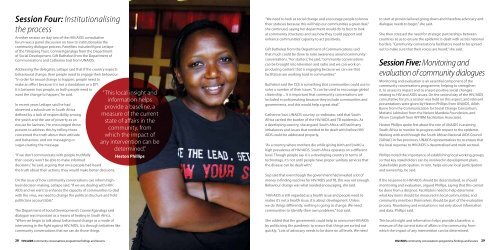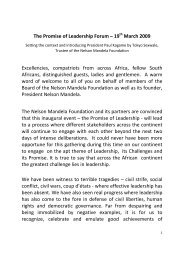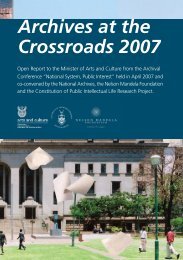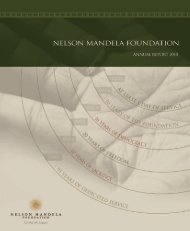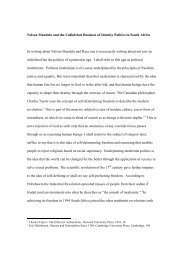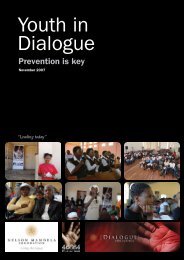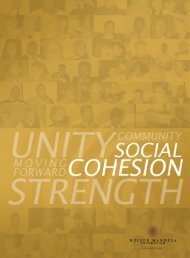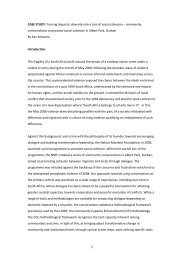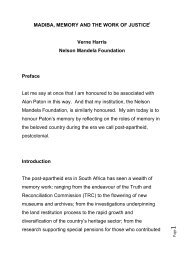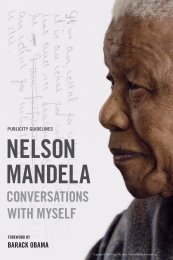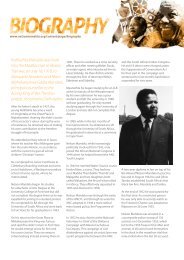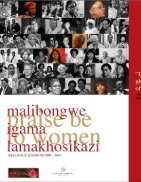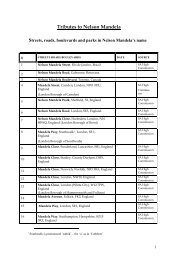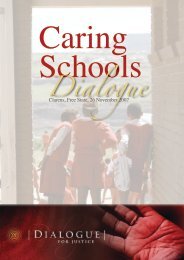Community dialogues - Nelson Mandela Foundation
Community dialogues - Nelson Mandela Foundation
Community dialogues - Nelson Mandela Foundation
Create successful ePaper yourself
Turn your PDF publications into a flip-book with our unique Google optimized e-Paper software.
Session Four: Institutionalisingthe processAnother session on day two of the HIV/AIDS consultativeforum was a panel discussion on how to institutionalise thecommunity dialogue process. Panellists included Kgosi Letlapeof the Tshepang Trust, Connie Kganakga from the Departmentof Social Development, Gift Buthelezi from the Department ofCommunications and Catherine Sozi from UNAIDS.Addressing the delegates, Letlape said that if the country expectsbehavioural change, then people need to engage their behaviour.“In order for sexual change to happen, people need tomake an effort because it is not a standalone or a DIY.It is between two people, so both people need towant the change to happen,” he said.In recent years Letlape said he hadobserved a subculture in South Africadefined by a lack of responsibility amongthe youth and the use of poverty as anexcuse for laziness. He encouraged thosepresent to address this by telling thoseconcerned the truth about their attitudeand behaviour, and not massaging orsugar-coating the message.“If we don’t communicate with people truthfullyHeston Phillipsthen society won’t be able to make informeddecisions,” he said, arguing that once people had heardthe truth about their actions, they would make better decisions.On the issue of how community conversations can inform highleveldecision making, Letlape said, “If we are dealing with HIV/AIDS and we want to enhance the capacity of communities to dealwith the virus, we need to change the political structure and holdpoliticians accountable.”The Department of Social Development’s Connie Kganakga saiddialogue was important as a means of healing in South Africa.“When we begin to talk about behavioural change as a mode ofintervening in the fight against HIV/AIDS, it is through initiatives likecommunity conversations that we can do those things.“This local insight andinformation helpsprovide a baseline, ameasure of the currentstate of affairs in thecommunity, fromwhich the impact ofany intervention can bedetermined.”“We need to look at social change and encourage people to knowtheir statuses because this will help our communities a great deal,”she continued, saying her department would do its best to lookat community structures and see how they could support andenhance communities’ capacity to act positively.Gift Buthelezi from the Department of Communications saidthat much could be done to raise awareness around communityconversations. “For starters,” he said, “community conversationscan be brought into television and radio and we can work onproducing content that is engaging because we can see thatfacilitators are working hard in communities.”Buthelezi said the CCE is something that communities could use tosolve a number of their issues. “It can be used to encourage globalcitizenship ... It is important that community conversations areincluded in policymaking because they include communities andgovernments, and this would help a great deal.”Catherine Sozi, UNAIDS country co-ordinator, said that SouthAfrica carried the burden of the HIV/AIDS and TB epidemics. Asa developing country, she argued, South Africa still had manyimbalances and issues that needed to be dealt with before HIV/AIDS could be addressed properly.“As a country where mothers die while giving birth and [with] ahigh prevalence of HIV/AIDS, South Africa operates on a differentlevel. Though people say it is a developing country in terms oftechnology, it’s not until people have proper sanitary services thatthe disease can be dealt with.”Sozi said that even though the government had invested a lot ofmoney in finding vaccines for HIV/AIDS and TB, this was not enough.Behaviour change was what needed encouraging, she said.“HIV/AIDS is still regarded as a health issue and people need torealise it’s not a health issue, it is about development. Unlesswe do things differently, nothing is going to change. We needcommunities to identify their own problems,” Sozi said.She added that the government could help to overcome HIV/AIDSby politicising the pandemic to ensure that things are sorted outquickly. “Lots of advocacy needs to be done on all levels. We needto start at provincial level going down and therefore advocacy anddialogue needs to begin,” she said.She then stressed the need for strategic partnerships betweencountries so as to ensure the epidemic is dealt with across nationalborders. “<strong>Community</strong> conversations facilitators need to be spreadout to make sure that their voices are heard,” she said.Session Five: Monitoring andevaluation of community <strong>dialogues</strong>Monitoring and evaluation is an essential component of thecommunity conversations programme, helping to strengthenit, to assess its impact and to ensure positive social changesrelating to HIV and AIDS issues. On the second day of the HIV/AIDSconsultative forum, a session was held on this aspect, and relevantpresentations were given by Heston Phillips from UNAIDS, AilishByrne from the Communication for Social Change Consortium,Motlatsi Lekhuleni from the <strong>Nelson</strong> <strong>Mandela</strong> <strong>Foundation</strong>, andAlison Campbell from AFFIRM Facilitation Associates.Heston Phillips spoke first about the role of UNAIDS in assistingSouth Africa to monitor its progress with respect to the epidemic.Working with and through the South African National AIDS Council(SANAC) in five provinces, UNAIDS representatives try to ensure thatthe local response to HIV/AIDS is decentralised and multi sectoral.Phillips noted the importance of establishing local working groups,so that key stakeholders can be involved in development plans.Stakeholder participation, in turn, helps ensure local participationand ownership, he said.If the response to HIV/AIDS should be decentralised, so shouldmonitoring and evaluation, argued Phillips, saying that this cannotbe done from a distance. Facilitators need to help determinewhat key items should be measured in local communities, andcommunity members themselves should be part of the evaluationprocess. Monitoring and evaluation is not only about informationand data, Phillips said.This local insight and information helps provide a baseline, ameasure of the current state of affairs in the community, fromwhich the impact of any intervention can be determined.28 HIV/AIDS community conversations programme findings and lessons HIV/AIDS community conversations programme findings and lessons29


